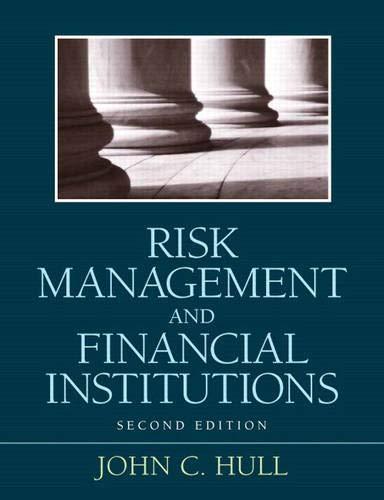Question
Question 3 (Hedge fund contracts and incentives to take risk). This question is loosely related to lecture 15 which briefly talked about hedge fund manager
Question 3 (Hedge fund contracts and incentives to take risk).
This question is loosely related to lecture 15 which briefly talked about hedge fund manager contracts. Our goal here is to think through how the hedge fund contract impact the fund managers incentive to take the risk.
Consider a hedge fund that only runs for a year, and it has assets under management (AUM) of $1 billion. The manager is paid by a standard 2+20 hedge fund contract. That is, at the end of the year, he collects management fees of 2% of AUM, and if the funds return is above 0% (the hurdle rate), he collects 20% of that in performance fees.
For instance, suppose the funds return is 5%, which amounts to $1 billion 5% = $50 million in dollar terms. The manager then collects $50 million 20% = $10 million in performance fees, in addition to the $1 billion 2% = $20 million management fees. If the funds return is below 0%, then the manager only collects management fees.
(a) Please plot a graph that represents the managers total pay as a function of the funds return. Specifically, fund return should be on the horizontal axis and the managers total pay is on the vertical axis. Mark the axis and values as clearly as possible.
(b) Let us now consider the risk-taking incentives of the fund manager. Suppose the manager can take one of the two following strategies:
Strategy 1 yields a sure 5% return all the time. Thus, it is a strategy with no risk.
Strategy 2 yields 20% return half of the time and -20% return the other half of the time. Thus, it is a strategy with zero expected return and much higher risk.
Because investors like higher returns and dislike risk, strategy 2 is dominated by strategy 1. That is, it is worse than strategy 1 in terms of both return and risk. Thus, if the manager chooses strategy 2, this is bad for investors.
Please compute the expected payoff5 of the manager under both strategies.
(c) Recall that hedge fund managers are relatively unconstrained in the strategies they take. Further, since they do not need to tell investors what strategies they choose, it is safe to assume that the hedge fund manager in this question will choose whichever strategies gives him the highest expected payoff. Which strategy, 1 or 2, will the manager choose?
(d) Now suppose the manager is only compensated with management fees but not performance fees. In other words, the contract is similar to that used in mutual funds. Assume that, if manager receives the same amount of expected payoff from two strategies, he prefers the one with lower risk. Which strategy would he choose?
Step by Step Solution
There are 3 Steps involved in it
Step: 1

Get Instant Access to Expert-Tailored Solutions
See step-by-step solutions with expert insights and AI powered tools for academic success
Step: 2

Step: 3

Ace Your Homework with AI
Get the answers you need in no time with our AI-driven, step-by-step assistance
Get Started


